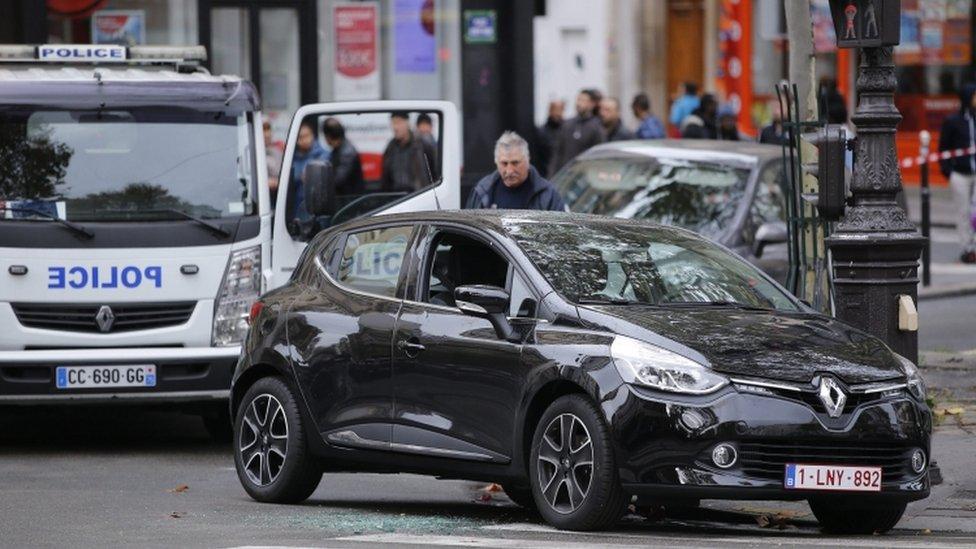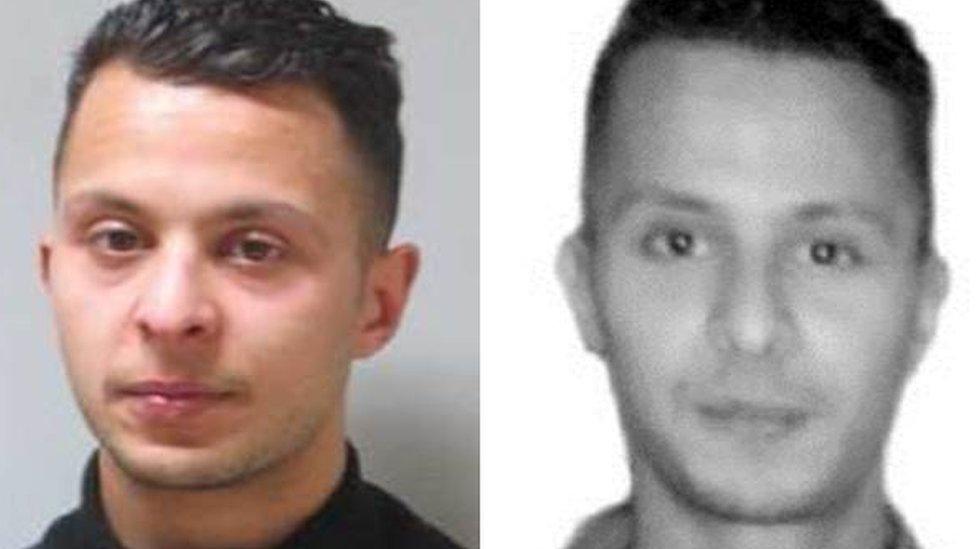Paris attacks: Police search suspects' premises
- Published
Footage from Le Point purportedly shows Paris attack suspect Salah Abeslam's hotel room
Police probing Friday's attacks in Paris have been searching premises they believe were used by the attackers.
A car rented by Salah Abdeslam, the suspected eighth gunman who is now the subject of an international manhunt, is also being inspected.
The so-called Islamic State (IS) group says it carried out the multiple attacks in which 129 people died.
France said it launched fresh raids on IS targets in Syria on Tuesday evening.
Ten French warplanes targeted IS's Syrian headquarters in Raqqa, Defence Minister Jean-Yves Le Drian told French TV.
European countries are on high alert. On Tuesday, a football friendly between Germany and the Netherlands was cancelled shortly before kick-off and the stadium in Hanover evacuated after "concrete" information about a bomb threat, according to the city's police chief.

Police are investigating a car thought to have been used by the attackers
In France, a Belgian-registered black Renault Clio was found parked near Montmartre in northern Paris. After police sealed off the area and ensured there was no booby-trap, the vehicle was towed away for forensic examination.
Investigators believe the car may have been used to bring the attackers to and from Belgium, from where French authorities say the attacks were organised.
Either Salah Abdeslam or his brother Brahim, named as another attacker, are thought to have rented a flat and two hotel rooms.
Images on French media of one of the hotel rooms being examined show syringes and tubes which could be bomb-making equipment.
French police appealed for help, external to identify a man whose image has previously been circulated as one of the attackers who died at the Stade de France stadium.
A Syrian passport in the name of Ahmad al-Mohammad was found next to him, but authorities believe this was a fake.
Follow the latest live updates
Salah Abdeslam is believed to have fled across the border to his native Belgium. Belgian police have released more pictures of him.
Salah and Brahim's brother Mohamed Abdeslam gave an interview to a French TV station in which he called on Salah to turn himself in.
French media reports say that police are hunting for a second fugitive in connection with the attacks, but this has not been confirmed by officials.
On Tuesday French media reported that a French jihadist, Fabien Clain, had been identified as the voice in a recording issued by Islamic State in which it said it had carried out the attacks.

New pictures of suspect Salah Abdeslam have been released
In an effort to prevent more attacks, France has mobilised 115,000 security personnel, according to Interior Minister Bernard Cazeneuve.
Mr Cazeneuve said 128 more raids on suspected militants had been carried out.
Russia has stepped up its attacks on IS targets in Syria, dispatching long-range bombers and firing a volley of cruise missiles.
The strikes follow a statement by Russia's security chief that a bomb brought down a Russian airliner over Egypt last month, killing all 224 people aboard.
Meanwhile, Belgium's government has raised its terror threat level because of the failure so far to arrest Abdeslam. Tuesday's football match between the national team and Spain has been cancelled as a result.
Mohamed Abdeslam, brother of suspects: "I was not involved in any way"
Initial reports said seven arrests near the German city of Aachen, on the Belgian border, were linked to the Paris operation but all those arrested were later released.
Also on Tuesday, France invoked a previously unused clause in the Treaty on European Union, external obliging other member states to provide it with "aid and assistance by all means in their power".
Within minutes, EU foreign policy chief Federica Mogherini said all 28 member states had agreed.

More on the Paris attacks
What happened in Paris? How events unfurled on Friday evening in the French capital
Hollande upstages opposition - French president's tougher line on counter-terrorism
Who were the victims? Details of some of the 129 people killed
The fight against Islamic State Can a modern, open Western capital ever be totally secure?
Most wanted: Alleged mastermind Profile of key suspect Abdelhamid Abaaoud

The measures came as US Secretary of State John Kerry visited Paris.
After meeting French President Francois Hollande, he said everyone understood that after Paris and other recent attacks "we have to step up efforts to hit them at the core" and improve border security.
He added that Syria was weeks away from a "big transition" after international talks in Vienna at the weekend.
A group of young Muslim men tell the BBC's Graham Satchell about how they are treated in Paris
Mr Hollande is due to fly to Washington and Moscow next week for talks with US and Russian leaders.
Paris attacks: Doctor on 'feeling of war' in A&E
In a speech to a joint sitting of both houses of parliament on Monday, President Francois Hollande suggested the following measures to combat the threat:
Extension of state of emergency by three months
Changes to the constitution to allow the government to revoke citizenship of any convicted terrorists of dual nationality. Currently only those born outside France and naturalised can lose their citizenship
Measures to speed up expulsion of foreign nationals considered a threat to public order
Budget increases and extra recruitment to security forces and judiciary
The attacks in Paris - which also left more than 400 people wounded, with 221 still in hospital, among them 57 in intensive care - have galvanised Western countries in their campaign against the so-called Islamic State.
UK Chancellor George Osborne said in a speech that IS was trying to develop the ability to launch deadly cyber-attacks on the UK, and announced a doubling of the UK's investment in fighting cybercrime.

Suspected Paris attackers
Salah Abdeslam, 26 - urgently sought by police
Brahim Abdeslam, 31 - named as attacker who died near Bataclan concert hall
Omar Ismail Mostefai, 29, from near Paris - died in attack on Bataclan
Bilal Hadfi, 20 - named as attacker who died at Stade de France
Ahmad al-Mohammad, 25, from Idlib, Syria - died at Stade de France (unverified)
Samy Amimour, 28, from near Paris - suicide bomber at Bataclan
Two other attackers died during the assaults in the city

According to French Prime Minister Manuel Valls, intelligence services have files on 10,500 individuals who have been radicalised to a greater or lesser extent.
As well as the attackers themselves, investigators are also reported to be focusing on a Belgian of Moroccan descent who is described as the possible mastermind of the attacks.
Abdelhamid Abaoud, 27, lived in the Molenbeek neighbourhood of Brussels, as did two of the attackers, and is now believed to be based in Syria, where he has risen through the ranks of IS.

What is Islamic State?
IS is a notoriously violent Islamist group which controls large parts of Syria and Iraq. It has declared its territory a caliphate - a state governed in accordance with Islamic law - under its leader Abu Bakr al-Baghdadi.
What does it want?
IS demands allegiance from all Muslims, rejects national borders and seeks to expand its territory. It follows its own extreme version of Sunni Islam and regards non-believers as deserving of death.
How strong is IS?
IS projects a powerful image, partly through propaganda and sheer brutality, and is the world's richest insurgent group. It has about 30,000 fighters but is facing daily bombing by a US-led multi-national coalition, which has vowed to destroy it.

Were you in the affected areas on Friday? Do you have any information you can share? You can get in touch by emailing haveyoursay@bbc.co.uk, external.
Please include a contact number if you are willing to speak to a BBC journalist today. You can also contact us in the following ways:
WhatsApp: +44 7525 900971
Tweet: @BBC_HaveYourSay, external
Send pictures/video to yourpics@bbc.co.uk, external
Text an SMS or MMS to 61124 or +44 7624 800100